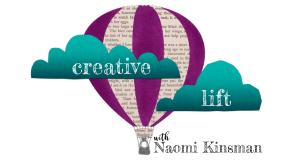If we had a Richter scale for the magnitude of a stuck story, I wonder if I could take my lesser moments of frustration more seriously. Maybe I could be more strategic about tackling them for what they actually are … stuck moments. Consider the possible scale. A 4.0 stuck moment causes disturbance and noise, but not too much damage. A 6.0 stuck moment is powerful, and may cause serious problems depending on the situation. Any stuck moment 7.0 and above creates visible shockwaves, destruction and often topples entire projects. Most of my stuck moments register around 4.0. They don’t destroy my momentum, but they still cause disturbance and noise.

A Stuck Story
I’m busy with a number of content development projects, so recently I haven’t spent a lot of time on my latest novel. I’ve accepted that ebb and flow in my creative process. However, I haven’t been taking 15-minute experimental moments to simply noodle around with my novel. I normally would play around that way in any demanding season. I’d find that exploration joyful. Even if it’s not the moment to do full-scale revision, I’m still a writer. And writers need stories to engage their imaginations–always. Except that I haven’t been doing those healthy, creative things. I’ve been in a 4.0 stuck moment.
The trouble had to do with the climax. Usually, when I start a story, I see the climax as an image or a movie in my mind. I brainstorm, plan and write toward that vision, leaving room for surprises along the way. In my current novel, I had an image, but it happened six chapters into the story. Thus, I was adrift when I passed that moment into the heart of the plot. Not to be discouraged, I wrote my way into the fog, and finished a draft.
The climax turned out to be a battle of wills. Physically, this moment was utterly anticlimactic. My finished draft left me disappointed and unimpressed. Now, I’ve written eleven novels at this point, so a little disappointment isn’t enough to register a 7.0 stuck moment. I figured it wasn’t a big deal. I’d come back when I had a better idea.
The Stuck Story Lingers
Except I didn’t have a better idea. Worse, I started feeling fuzzy around my edges. I knew something was lacking, but didn’t know what was wrong. The problem? I was a writer without a story. My imagination was bored.
A New Lens
This weekend, I went to see Wrinkle in Time for a second time. One thing I explore in Writerly Play is the value of using the Library. This means looking closely at art–books, paintings, music, performances, film, sculpture, you name it. In particular, I considering an artwork a second or third time is significant. The first time through, we’re caught up in the experience. We ought to be. However, follow-up experiences can be more intentional. We can think about the what, how, and why.
While watching the climax scene in A Wrinkle in Time, I understood what had been bothering me about my standoff scene in my novel. The obvious realization that “something had to happen,” may sound trivial, but the value of the discovery was in the specificity of the movie’s successful climax. First, watching a well-crafted, active climax involving a battle of wills made hope glimmer at the end of my tunnel. It could be done. Second, the colors, shapes, movement, pacing and dialogue gave me concrete elements to consider. How might each of those elements play out in my story?
Beyond Imitation
I used to be so afraid of imitation that I limited my creativity. I’ve started to see that examining the specifics of a beautiful artwork helps me to take my own work to another level. As I’ve become more confident in my own voice, I’ve learned how to gain insight from masterworks while remaining true to myself as an artist.
For me, the next step seems to be making a practical connection between 4.0 stuck moments and intentional exploration of lenses. Rather than walking away from stuck stories and hoping my subconscious will reengage, maybe I could seek out doorways into that exploration. Little stuck story moments may not be earth-shattering, but they are still uncomfortable, and life would be happier and more colorful if I could limit them. Lenses invite my imagination out to play. They aren’t about responsibly fixing problems, but rather about the process of discovery.

